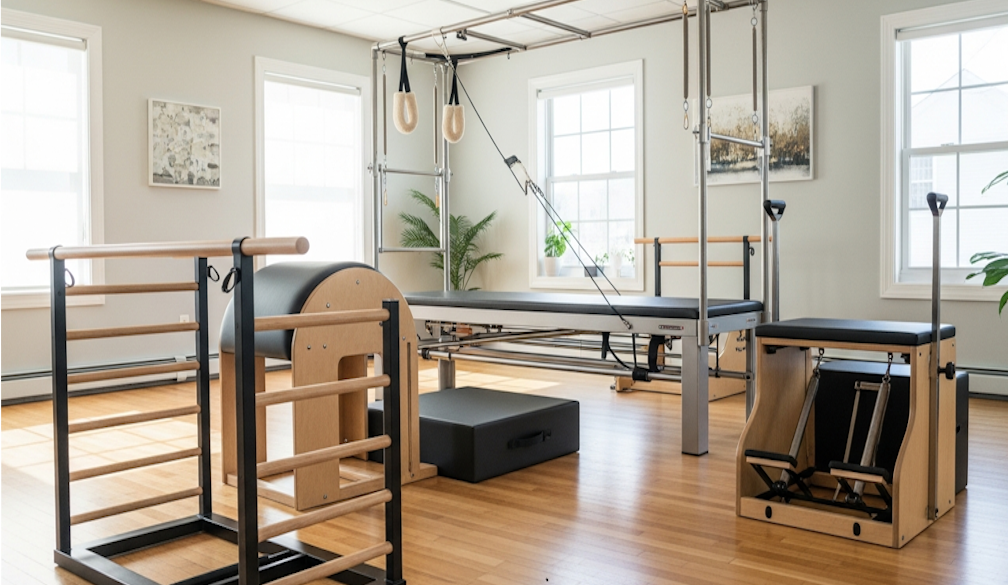The Cadillac, Wunda Chair, and Ladder Barrel: What Each Pilates Apparatus Is Designed For
- Written by Daily Bulletin

Pilates is well known for its versatility, precision, and ability to strengthen the body from the inside out. Beyond the classic mat repertoire, specialised Pilates apparatuses offer targeted resistance, alignment support, and endless movement variations. Whether you’re deepening your practice at home or outfitting a professional studio through trusted suppliers like Pilates Direct, understanding what each piece of equipment is designed for helps you choose tools that genuinely enhance strength, mobility, and body control.
Below, we explore three of the most iconic apparatuses in the Pilates world: the Cadillac, the Wunda Chair, and the Ladder Barrel—each bringing something unique to the discipline.
The Cadillac: Full-Body Support, Stretching, Strength, and Stability
Often considered the most visually striking piece of Pilates equipment, the Cadillac (also known as the Trapeze Table) is a versatile apparatus designed to support a full range of motion while providing exceptional stability.
What It’s Designed For
The Cadillac is engineered to assist, challenge, or stabilise the body depending on the exercise. With its bars, straps, springs, and trapeze, it allows for hundreds of variations tailored to beginners through to advanced practitioners.
Key benefits include:
- Full-body strength training: The spring system builds deep, controlled strength, especially in the core and upper body.
- Gentle rehabilitation: The stable table surface and adjustable springs make it ideal for injury recovery and low-impact strengthening.
- Assisted stretching and mobility: The push-through bar and roll-down bar help lengthen the spine, open the hips, and release tension safely.
- Advanced acrobatic movements: Experienced practitioners use the Cadillac for inverted work, dynamic balance challenges, and aerial extension exercises.
For studios, the Cadillac is often the centrepiece because it accommodates such a broad range of clients and training needs.
The Wunda Chair: Compact Power and Functional Strength
The Wunda Chair is the smallest of the classical Pilates apparatuses, but don’t let its size fool you—it’s one of the most challenging pieces of equipment in the method. Originally designed by Joseph Pilates as both a piece of exercise equipment and functional home furniture, its modern versions retain that spirit of practicality and intensity.
What It’s Designed For
With its spring-loaded pedal and upright box structure, the Wunda Chair emphasises controlled, functional strength.
Key strengths of the Wunda Chair include:
- Powerful core and shoulder engagement: Many exercises require the practitioner to stabilise the spine against resistance while moving through a small range of motion.
- Balance and coordination training: Standing, kneeling, and side-loading exercises activate smaller stabilising muscles that often get overlooked.
- Athletic conditioning: The Chair is a favourite for athletes due to its ability to build explosive leg strength and full-body integration.
- Small-space versatility: Its compact design makes it perfect for home studios or practitioners with limited space.
The Wunda Chair builds resilience and balance while challenging even strong, experienced Pilates lovers.
The Ladder Barrel: Spine Mobility and Supported Stretching
The Ladder Barrel focuses on flexibility, back mobility, and core control. With its curved barrel and sturdy ladder rungs, it provides a unique environment for controlled spinal extension and supported stretching.
What It’s Designed For
The Ladder Barrel is all about lengthening, opening, and strengthening the spine and torso.
Key benefits include:
- Improved spinal articulation: The barrel’s curve supports exercises that mobilise the spine segment by segment.
- Deep stretching: Hamstring, hip flexor, and oblique stretches are intensified and safely supported.
- Core strengthening: The curved surface challenges the abdominals in both flexion and extension.
- Posture refinement: The Barrel is exceptional for opening the chest, improving thoracic mobility, and counteracting the effects of long hours sitting.
For anyone wanting to improve flexibility or work on posture, the Ladder Barrel is an invaluable addition to a Pilates repertoire.
Which Apparatus Should You Choose?
Each apparatus offers something unique:
- Choose a Cadillac if you want the most versatile, full-body apparatus that accommodates rehabilitation, strength training, and assisted movement.
- Choose a Wunda Chair if you’re looking for compact, high-intensity functional training that builds core stability and athletic power.
- Choose a Ladder Barrel if you’re focused on flexibility, spinal mobility, and strengthening through controlled extension and stretch work.
Most studios use all three to cater to a broad range of abilities and goals—but even adding just one to your practice can dramatically elevate your training
Whether you're a studio owner expanding your equipment selection or a home practitioner building a personal Pilates sanctuary, understanding the purpose of each apparatus helps you get the most out of your investment. With quality equipment and guidance, you’ll find that each tool enhances movement in its own meaningful way, enriching your Pilates practice from every angle.






